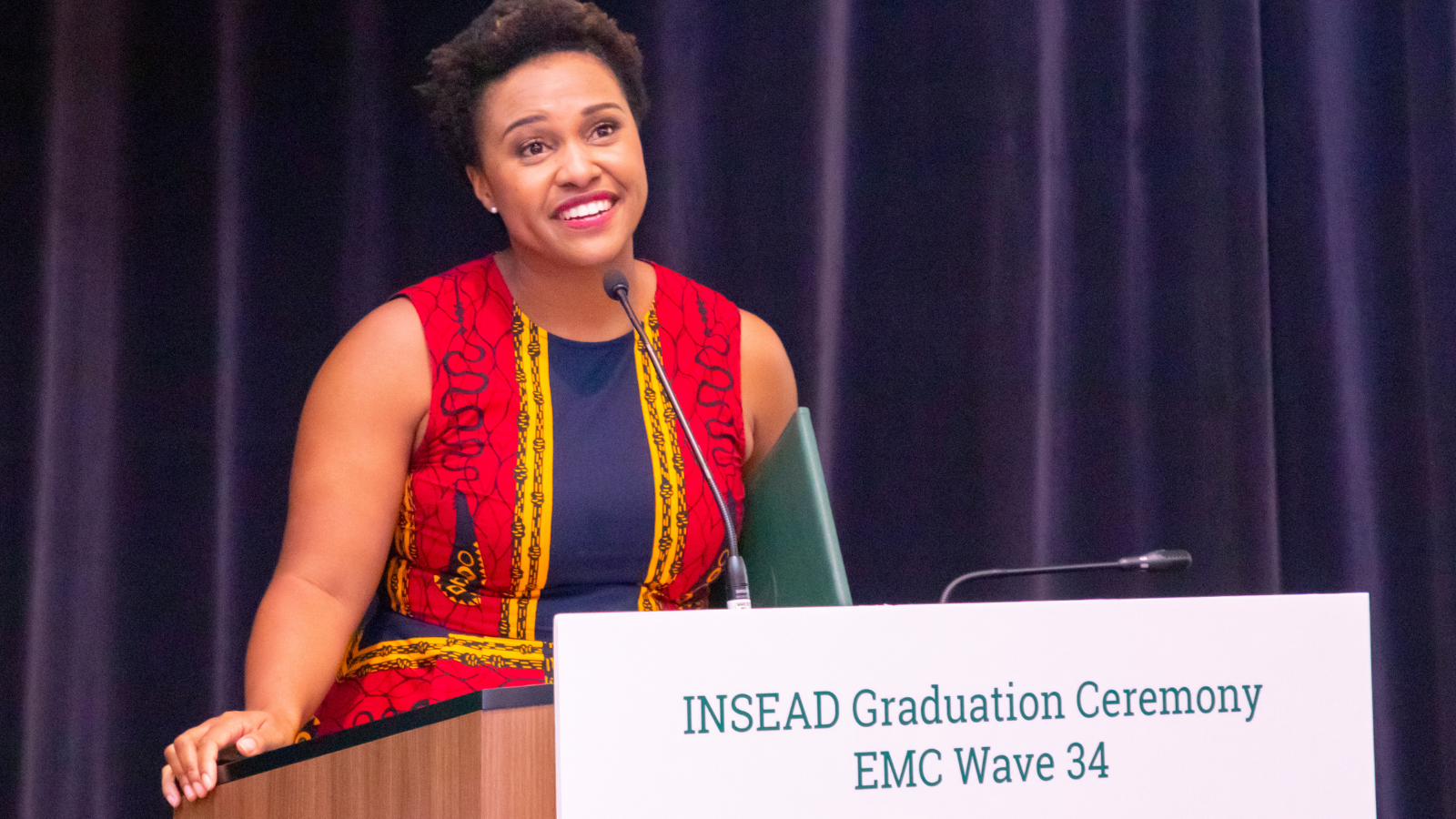
We Met as Strangers
After nearly two years, navigating a global pandemic and becoming a mother for the first time, I graduated as part of the Executive Master in Change (EMC) Class of 2022 in Singapore.
It was such an honour to be chosen to deliver a speech on behalf of the graduating class. There were many moments I was not too sure whether I would be able to reach that finish line of graduation, especially given the many challenges faced as a mum of a newborn.
To be chosen to give this speech is meaningful beyond ways words could ever describe. I am grateful for the opportunity to share this speech with the wider INSEAD community.
I. An Encounter with Strangers

Nearly two years ago, in a room not unlike this one, we met for the first time — strangers in the strangest of times.
You may recall. It was Thursday, October 20, 2020. Trump was still President of the United States, Pfizer and Moderna were pushing hard to produce a viable vaccine, and, while Singapore had been lauded as the world’s ‘poster child’ in the global fight against COVID, the World Health Organisation was reporting over 40 million cases globally, along with over one million confirmed deaths.
Strangers in the strangest and most unsettling of times.
We were starting a programme of “transformation”. Unsure of what was ahead. Little did we know that that transformation would involve — require — an encounter with “strangeness.” And with “strangers.”
Macmillan dictionary defines “strange” in this way:
"that which is unusual or unexpected, especially in a way that surprises or worries. The unknown. Alien. Not yet experienced."
As we’ve learned, the deepest, most internal of transformations requires that we encounter such a strangeness.
In ourselves, in others, in our organisations, and in our past.
It requires that we see things we have long worked hard to avoid. To even look straight into the eyes of that which we most fear.
And as we have learned, this encounter with strangeness best occurs in a safe space. Why? Because it gives us the security and courage to do this hard work.
For all of us, the EMC has served as such a safe space. For this, I know, we are all deeply grateful.
II. A Strange New Intimacy Within the Hybrid World
For our Wave, this encounter with the unknown took on its own particular character and brought about its own forms of transformation.
Two things come to mind that I would like to touch upon:
- Our need to navigate a hybrid world throughout the entire EMC journey, and
- Our Wave’s commitment to deal with our grieving for in-person connections by replacing it with efforts to deepen the intimacy within our group and foster a greater inclusivity.
Navigating a hybrid world
In 2020 when our Wave started, the world was at the height of the pandemic.
This meant that for several people in the Wave, it was not possible to enter Singapore because of government regulations. As we graduate today, there are still some individuals in our Wave we have never met in person. Yet, we still feel extremely connected to them.
Intimacy and Inclusivity
The grief that came from not being able to socialise with one another outside class was replaced with an increased intimacy within the group as we each made an extra effort to be connected by levelling the playing field. Whether you were able to attend in person or through “Zoom-land” — which became a common saying for us — a sense of belonging emerged between strangers on the same but different journeys.
The past two years for our Wave have also been punctuated by significant, often life-altering moments.
Finding love, getting engaged, entering into marriage, leaving those unions, facing divorce.
Trying for babies, becoming pregnant, giving birth, mothering and fathering.
Moving countries, and, for many of us in many ways, changing roles.
But there were also the much harder blows that some of us had to endure: facing illness, undergoing surgery and even losing those most dear to us.
Yes. We were strangers together in the strangest of times.
III. Strangers No More
I will close on what seems a personal note, but one that may resonate with many of you.
It’s about my own encounter — as a result of the EMC — with someone you could call a stranger.
She was someone I knew of but didn’t know much about. An uninvited guest from my unremembered past. And even today, I have no photo of her and I don’t even know her name. But chances are she looked somewhat like this.

She was my great grandmother. An enslaved woman, living in Curaçao in the late 19th century. A woman with no rights of her own. The property of another. Someone not legally regarded as a full human being.
But because of her, I am here today.
And because of her, my daughter Logan Mae is here today.
And because of this programme and all of us working together — offering support, kindness, a belief in one another, and even a willingness to poke each other when needed — we have all, just as I have, come to know more about the transformative power of the strangers and strangeness within all of us.
We sit here now, nearly two years after that first day in October 2020, strangers no more.

What we are, instead, is more humane, more empathetic, and, we all hope, more enlightened. May this journey continue for all of us.
Thank you.
--
This speech was written in collaboration with Rosemary Morrison at The International Writers Studio.



